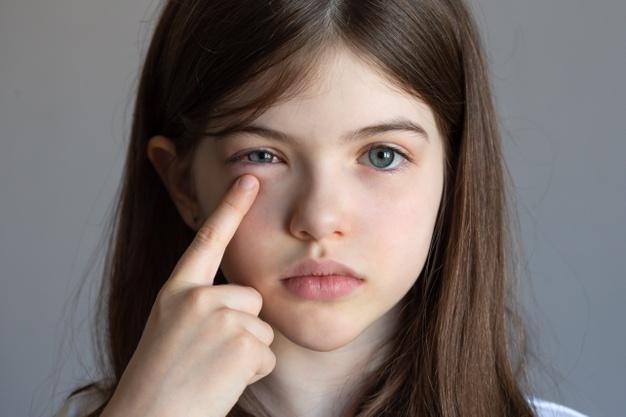 Swollen eyelid can be caused by a wide variety of issues, from allergies to poor hygiene to bacterial infections.
Swollen eyelid can be caused by a wide variety of issues, from allergies to poor hygiene to bacterial infections.
It’s often difficult to tell whether or not it’s necessary to visit the doctor. To help gauge the severity of your swollen eye/s, it’s important to first get a good understanding of what might be going on.
The Difference Between Swollen and Puffy Eyes
“Puffy eyes” and “swollen eyes” are often used interchangeably, but it’s important to note that the two terms have different meanings.
While swollen eyes are caused by infections, injury or a reaction to an allergy, puffy eyes are associated with water retention or lack of sleep. Puffy eyes will usually affect both eyes and appear soft and mild, while it’s likely swollen eyes will affect just one eye and show more severe, painful swelling.
Symptoms of Swollen Eyelids
Eye swelling is a symptom of conditions like allergy and infection. Eye swelling is often accompanied with excess tear production, eye irritation/itching, dry eyes and sensitivity to light.
Other symptoms of swollen eyelids include:
- Pain in the eyes
- Blurred vision
- Noticeable worsening of your vision
- Tiny substance at appear to float in your eyes
- Eye irritation
- Pain when moving muscles of the eye
- More malicious underlying causes, such cancer of the eyes that cause your eyes to move forward, replicating a swollen eyelid.
Potential Causes of Swollen Eyes
-
Allergies
Your eyes may swell in response to allergens like pollen, dust or animal fur. When the eye comes into contact with irritating substances, it releases immune proteins called histamines to fight the allergens. The build up of histamines can cause your eye to swell. If your swelling is accompanied by itching, it is possible allergies are the culprit. You can reduce allergic swelling with over-the-counter antihistamines.
-
Improper Contact Wear
 Wearing dirty or damaged lenses, or leaving your contacts in when you go swimming can cause irritation and/or infection and cause your eyelids to swell.
Wearing dirty or damaged lenses, or leaving your contacts in when you go swimming can cause irritation and/or infection and cause your eyelids to swell.
To treat this, consider buying new lenses or invest in a better-quality contact lens cleaner. And always remember to take your lenses out when you go swimming or go to sleep.
-
Infections
Eyes, like any other part of the body, are prone to bacterial and viral infections. One common infection is conjunctivitis. Conjunctivitis is the inflammation of the clear lining of the surface of the eye. This can be treated with antibiotic or antiviral eye drops.
Another common infection is a stye. Bacteria in the eyes can cause the meibomian glands (glands in the eye) to become blocked. Usually a stye (a small, reddish bump) will form in the corner of the eye. It can be alleviated by applying a warm compress, but it’s best to see the doctor for more advice.
Other more serious causes of eye swelling include orbital cellulitis, graves’ disease, ocular herpes and more. These conditions can only be treated by medical professionals.
How to Treat Swollen Eyelids?
If your swollen eye is caused by things such as lack of good night sleep, stress, or retention of fluid, then you can use over the counter medication or home remedies to treat the condition. For example, you can treat eye discharge using saline solution. On the other hand, you can use ointment, antibiotic cream or eye drops to treat an infected eye to reduce discomfort
To alleviate the symptoms of swollen eyelids, here are some ways that you can do at home:
- Dip a clean cloth on clean water then place it on the eyes for about 15 minutes at least twice each day. This will help relax the crust from the eye lashes and also remove excessive oil from blocking the glands in the eye.
- Gently clean your eyelids using a cotton cloth that is rinsed with soap solution and water. It is important to make sure that you thoroughly rinse your eyes after this process.
- Avoiding the use of contact lenses and makeup for the time being to give your eyes some rest.
- Use eye lubricants to alleviate dry eye-related symptoms from swollen eyelids.
When to Visit the Doctor
If your swollen eye/s don’t go away after over-the-counter treatments like antihistamines, antibiotics/ antiviral eye drops, or with better hygiene practices, then it’s time to visit the doctor or an eye care professional.
An eye care expert will conduct a thorough examination to determine what caused your swollen eyelids. The diagnosis whether your eye infection is caused by infection, inflammation, or any other cause. Your eye care professional may also prescribe antibiotics or eye drops to relieve the discomfort or pain associated with swollen eyelids.
Never been to an eye doctor? No problem, planoEyecheck has you covered. This online platform connects you with local optometrists and helps you book an appointment in under one minute!
If you’re having any doubts about a swollen eye, best be safe than sorry and get checked today.
Leave a Reply